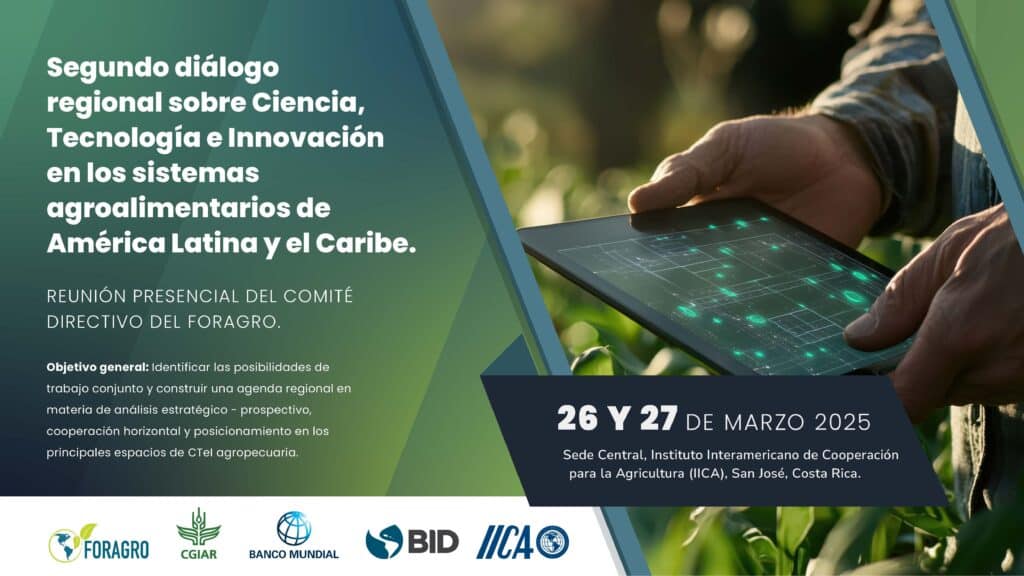
The dialogue at IICA’s headquarters will focus on developing a strategic roadmap for science, technology, and innovation in agriculture and the agri-food systems of the Americas.
San José, 25 February 2025 (IICA). The Inter-American Institute for Cooperation on Agriculture (IICA) will host the Second Regional Dialogue on Science, Technology, and Innovation in the Agri-Food Systems of Latin America and the Caribbean, to be held on March 26–27, 2025, in San José, Costa Rica.
The second virtual assembly of the Forum of the Americas for Agricultural Research and Technological Development (FORAGRO), which brought together representatives from the agricultural science and technology sectors and agri-food systems in the region—including national and international research institutes, cooperation organizations, academia, the private sector, and farmer organizations—was responsible for selecting the event’s venue.
This new dialogue is part of ongoing efforts to strengthen and renew FORAGRO.
Established in 1997 as the hemispheric multisectoral mechanism for debate and consensus-building on research and innovation topics impacting the agri-food sector in the Americas, FORAGRO’s executive secretariat is managed by IICA. Its members include organizations from the public, private, academic, and productive sectors, as well as civil society, among others.
The dialogue at IICA’s headquarters will focus on developing a strategic roadmap for science, technology, and innovation in agriculture and the agri-food systems of the Americas. It will also seek to advance horizontal cooperation through the creation of a platform that consolidates, systematizes, and shares knowledge, best practices, and lessons learned from ongoing cooperation initiatives to foster dialogue and collaboration in Science, Technology and Innovation.
Additionally, the meeting will aim to discuss a strategy to enhance and better leverage the region’s participation in key global forums on science, technology, and innovation for agriculture and agri-food systems.
“We are convinced that FORAGRO must be updated to align with the new needs and opportunities of a region that looks to the future with forward-thinking roadmaps, where horizontal cooperation should not be an afterthought or a matter of convenience, but rather a strategic approach to working more effectively and securing a stronger presence in global discussions on agriculture,” stated IICA’s Director General, Manuel Otero.
The dialogue will bring together members of the scientific community and executive secretaries of American cooperation mechanisms for science, technology, and innovation in agri-food systems, as well as authorities from the national agricultural research and technology institutes of the Americas, including Argentina’s National Institute of Agricultural Technology (INTA), Chile’s Agricultural Research Institute (INIA), and the Brazilian Agricultural Research Corporation (EMBRAPA). Representatives from farmer organizations and institutions such as CGIAR and the International Food Policy Research Institute (IFPRI) will also participate.
A stronger FORAGRO
As part of the actions taken during FORAGRO’s second virtual assembly, the forum approved the incorporation of 21 new members. These include organizations such as the World Bank, CropLife Latin America, the Group of Southern Agricultural Producers (GPS), IFPRI, New Mexico State University’s College of Agricultural, Consumer, and Environmental Sciences, and Zamorano University.
With these new additions, the forum now comprises a total of 73 entities.
“The inclusion of these institutions in FORAGRO responds to the need to strengthen and revitalize the Forum as a regional platform for strategic thinking, horizontal cooperation, and regional positioning. The contributions of these new actors are key to shaping FORAGRO in a way that meets the demands and opportunities in agricultural science and technology in the region,” said Muhammad Ibrahim, IICA’s Director of Technical Cooperation and Executive Secretary of FORAGRO.
More information:
Hugo Chavarría, Manager of IICA’s Innovation and Bioeconomy Program.
hugo.chavarria@iica.int – secretaria.foragro@iica.int











